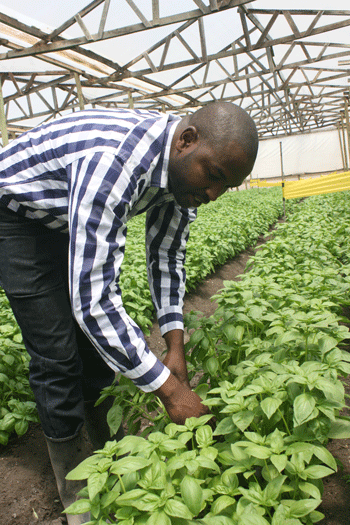
Charms flowers, Herbs- Chives and Basil cultivation escapade
The rise of herb consumption globally because of their medicinal value has led to a steady rise in cultivation of the crop. As the demand increased, at first they were only grown by small scale farmers but of late flower farms in the country have also diversified to herbs cultivation.
Charm Flowers Limited which is located at Kisaju, Kajiado County is one of the reputable flower farm growing and exporting herbs.
The company grows roses and herbs of world renowned breeders. Currently, the company plants two types of herbs; Basil (Sweet & Thai) and Chives.

Sweet Basil (OcimumBasilicum) is native to India and other tropical regions of Asia. It belongs to the mint family, also known as Great basil and Saint Joseph’s Wort. Often it is used as a seasoning in cooking’s; well known for its use in Italian cuisine and is one of the primary ingredients in pesto sauce. It contains eugenol (sweet basil).The farm has devoted 4.5 hectares for its cultivation; specializing in growing GB 5003 variety, while growing Thai basil and Purple basil in small quantities.
Chives on the other hand have a slender round, hollow, grass-like onion-flavored foliage that can be snipped for salads, soups, eggs and cheese dishes. It is a member of the onion family. It is a cool weather perennial herb. Charm Flowers has dedicated 1 hectare for cultivation of Chives.
According to Moses Kuria, the Production Manager in charge of herbs in the farm, Basil and Chives can be planted as direct seeds or propagated. “Initially we sow seeds but nowadays we get them from a seedling propagating firm. Basil take a period of 18 to 22 days in seed propagation while chives takes a period of one month,” he said.
Cultivation of basil is labor intensive, with processes such as making beds, seedlings planting, harvesting and grading being very laborious. They are planted using inorganic fertilizer such as DAP. They strictly do not use organic manures. “There are strict regulations on the various chemicals that are to be used when cultivating basils. We usually follow a certified list from PPPL that specifies even the pre-harvest interval before harvest.,” Kuria explained.
Basil and chives are grown in greenhouses. They are very susceptible to downy mildew disease, which can wipe a field in 2 days. When it rains the produce can easily be attacked by downy mildew if grown in open fields. They are highly vulnerable to pests and diseases hence demand a lot of care and experience to achieve a bumper harvest.“Most people are turning away from basil and chives due to its farming complexities; they are growing other varieties of herbs,” Moses commented.
Pests such as leaf miner, white flies, caterpillars and thrips pose a major challenge to herbs. To curb on the risks this vampires poses, the farm uses sticky traps and fix nets around their greenhouses to prevent them from gaining entry and also they spray to control. They use yellow sticky paper to trap leaf miner and white fliers while blue paper traps thrips, delta traps for caterpillars. Thrips are very difficult to fully eliminate but they are able to bring them under control.
Charm Flowers has adopted preventive measure against diseases such downy mildew, botrytis and fusarium. Kuria opines that prevention control is effective in that when the disease attacks, it finds the crop already hardened hence won’t be able to germinate on the pores of the leaves. “These diseases are very destructive, once they attack it’s hard to control them. Fusarium is deadly in that it attacks a crop from the base more or less as the botrytis does and travel up through the enzyme system and eventually the crop wilts, “Kuria elucidated.
Basil takes a month for it to be ready for harvesting while Chives take up to 3 months. The farm harvests 2.0 to 2.5 tons of basil in a day for export to European Markets. The herb is harvested once per week for a period of 6 weeks.
“Chives take a long period, 90 days before the first harvest and 25 -30 days interval for consecutive harvests for a period of one year. To supply our customers consistently we plan and plant at close intervals so that we have a harvest throughout the year,” Kuria explained.
Most of their buyers would want a little of other herbs for complementary, thus the company is in the process of introducing other herbs such as Thyne, Rosemary and Mint.

